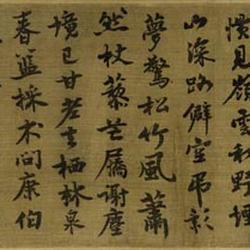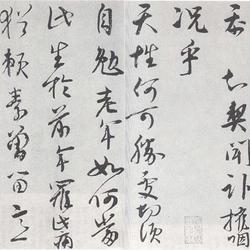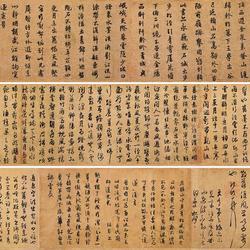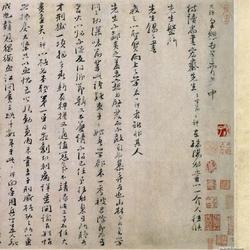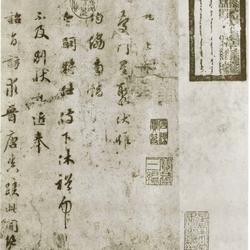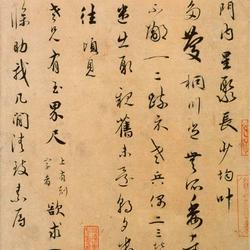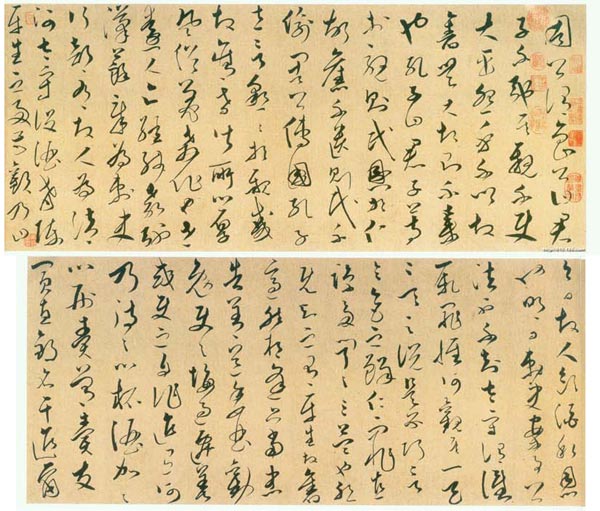
Xie Changyuan's "Self-Warning Speech on the Right Side of the Seat" Volume, Wen Tianxiang's cursive script, paper, vertical 36.7cm, horizontal 335.7cm, written in the ninth year of Xianchun (1273), collected by the National Museum of China
Explanation of Xie Changyuan's "Setting on the Right Side of Self-warning Ci":
The Duke of Zhou said to the Duke of Lu: A gentleman does not relax his ties to his relatives, and does not make his ministers resentful? If he does not regard the old as old and there is no serious reason for it, he will not abandon it. Confucius said: If a gentleman is devoted to his relatives, the people will thrive in benevolence; if he does not leave behind the old, the people will not steal. The Duke of Zhou preached the country, Confucius established his words, and he was sincere to relatives and old friends, all of which were enriched with customs and beautiful education. The world is far away and people are dying, and the scriptures are broken and the teachings are relaxed. Su Zhang of the Han Dynasty was the history of assassination. He had an old friend in the traveling department and was the prefect of Qinghe. He set up wine and food and Chen Pingsheng was very happy. Nai said: Today an old friend drinks wine, which is a personal favor; tomorrow, the assassination case is a public matter. I don’t know who the prefect is calling guilty, but how can he look at what he said in one day or two days! This must be a clever word, a fresh look, a benevolent one, but not a straightforward one. I’ll forgive you for hearing more about it. This is the third benefit. However, since we know that there are old friends in our lives, and we meet again by chance, we can only give advice, humiliation, and encouragement to make them repent and do good, or make them make their own progress or retreat. Why treat him with a glass of wine and add criminal responsibility? If you sell friends and buy straight, you will get the name of Qian Jin, and there are many people who comment on it and they will not use it again. But what's the point? As the world changes, people's hearts become worse. As for Hanzi in the Tang Dynasty, he lamented that there was a stone under his eyes, something that animals would not do. Suzi of the Song Dynasty said that he had been fighting for half a year to survey, even if he killed people. Looking at Han and Su's words, Su Zhang's attentive joy with a glass of wine is nothing. The teachings of Zhou and Confucius will surely turn into virtue. A gentleman has his purpose.
You Jingzhai thanked Mr. You for sitting on the right and warning yourself. The reason why people are human is because of human ethics. Friends are one of the most important things in human relations. They regard monarchs, ministers, fathers, sons, brothers, and couples. Although their love and courtesy may lead to death, the reason for righteousness is that they are all incapable of themselves. But it comes from nature, so it is the end of human nature. Relatives do not lose their kinship, so they do not lose their kinship. Each one does his part, so he is a human being. Since the Su Zhang of the Han Dynasty, there have been words about private favors and public laws between the governor and old friends, which have been regarded as solid by the world. However, no one knows what is wrong. It has been passed down as old facts and the customs have been the same for more than a thousand years. The teacher is based on the human heart. According to the meaning of the scriptures, he uses the method of killing the heart in the Spring and Autumn Period. He sells his friends to buy his friends and exploits his reputation to make money. Therefore, Zhizhang cannot do anything for selfish reasons, which is the worst kind of selfishness. At that time, Yao was serving as a public official and a minister. How could the acquisition of external things be enough to save the loss of his original intention, let alone the need for acquisition. The saying goes: Having seen this, you will know benevolence. Ancient Confucianism said: A gentleman is too thick, a villain is too thin, and the rules are not enough. The teacher's theory is enough to establish a good moral code and a good husband. If you come to learn from it, you will be obsessed with it and you will be correct. Sir, you are so kind. It was an auspicious day in the sixth month of Guiyou in Xianchun. Later, I learned Wen Tianxiang's calligraphy.
Research on Wen Tianxiang's cursive script "Xie Changyuan's "Setting on the Right Side of Self-Warning Ci" Volume"
Wen Tianxiang (1236-1282), whose courtesy name was Song Rui and whose nickname was Lushan, was Wenshan, was from Jishui, Jizhou (now Jishui, Jiangxi Province). In the fourth year of Baoyou's reign in the Southern Song Dynasty (1256), Lizong was selected as the first. Li Zhirui, Gan and other prefectures, Xian Chunzhong except the right prime minister and privy envoy. The king of Wei was established, and Shaobao was added, and he believed in the Duke of the country. He was a famous statesman, writer, calligrapher, important official in charge of government, and a famous anti-Yuan general in the Southern Song Dynasty. In the first year of Kaiqing (1259), the Mongolian army besieged Ezhou. They wrote a letter actively advocating the war of resistance and asked Dong Songchen, who was in charge of moving the capital to be beheaded. In the first year of Deyou (1275), the Yuan army marched eastward, raised troops to serve the king, and paid homage to the right prime minister and privy envoy. Prime Minister Chen Yizhong was at odds and led his troops to move around Fujian and Guangdong to deal with the Yuan army. In the first year of Xiangxing (1278), he was defeated and arrested. He refused the enemy's inducement to surrender and wrote the poem "Crossing the Lingding Ocean" to express his ambition. He was imprisoned in Dadu for three years and died for his country at the age of 47 in January of the 19th year of the Yuan Dynasty (1282). There is a praise in his belt that says: "Confucius said it was benevolence, Mencius said it was righteousness. But his righteousness was exhausted, so Benevolence. What did you learn from reading the books of sages? From now on, you will be worthy of the common people." His writings were based on the Jin and Tang Dynasties, and he wrote "Mr. Wenshan's Collection", "Jianning Prefecture Chronicles" and "Song History". In the last years of the Southern Song Dynasty, the country's national power was declining and there were internal and external troubles. In the art of painting, all that is left is in ruins, and in the art of calligraphy, it is all lost. Wen's calligraphy is as what Kuo of the Ming Dynasty said in "Zhenze Collection": "The public is loyal and loyal, and Zhuo It is between heaven and earth, and the calligraphy and painting are exquisite, even if the paper and ink are subtle, they are all meticulous." Wu Sheng of the Qing Dynasty's "Daguan Lu" said, "I believe in the Duke of the country and be loyal to the important festival. Er, there is no Gongxuan Yu, but the treasure of the world, Gonghan Mo, is comparable to that of Yan Pingyuan in the Tang Dynasty. The two Gongshu do not have to be the same, but their loyalty and integrity are the same." It can be seen that the character and calligraphy quality of the Wen family should be the most popular calligraphy in the late Southern Song Dynasty. Everyone. According to relevant records, Wen Tianxiang was famous for his small seal calligraphy at that time. There is such a description in "Shu Shi Hui Yao", "(He) is good at small seal script. After tasting an inkstone in alchemy, he said: 'The clothes of purple are soft and soft, and the clothes of jade are soft. The belt is sparkling. The abyss is hidden in the middle, and the marsh outside is spreading. Wuhu: The heart is strong, and the longevity is passed down by my writing. Luling Wen Tianxiang Shu.' A total of forty-four characters, the strokes are pure and vigorous. , just like him." Today, there is no biography of his small seal script in the world. Most of his writings and letters are written in cursive script. The cursive script "Xie Changyuan's "Setting on the Right Self-Warning Ci"" is his representative masterpiece of calligraphy.
This paper scroll is 36.7cm long and 335.7cm wide. It was written in the ninth year of Xianchun (1273), when Wen was thirty-eight years old. The work has 71 lines in cursive script, including 44 lines of "Setting on the Right Self-warning Speech", 315 words, and the font is slightly larger. The postscript contains 27 lines and 281 words in a small font. The inscription is "Xian Chun Gui You auspicious day in June, Hou Xue Wen Tianxiang calligraphy", and the seal script "Wen Shi Tianxiang" is sealed with Zhu Wenfang seal. At the back of the volume, there are postscripts written by Wang Yinglin of the Southern Song Dynasty, inscriptions by Jiang Yan of the Yuan Dynasty, Wan Yunhui, Zhu Zhi, Liao Ju, Cheng Qichong and others of the Ming Dynasty. The first volume is inscribed by Emperor Qianlong of the Qing Dynasty, "Wen Tianxiang wrote the right words of Xie Changyuan's seat, and the collection of the imperial palace" and other words. At the bottom is the seal script "Divine Product" and "Qianlong Chenhan" with Zhu Wenfang seal. It was recorded in books such as Du Mu's "Yuyi Bian" in the Ming Dynasty, Wu Sheng's "Daguan Lu" in the Qing Dynasty, An Qi's "Mo Yuan Hui Guan", and Qing Neifu's "Shiqu Baoji Continuation".
Regarding the name of Xie Changyuan mentioned in the volume, it can be found in "History of Song Dynasty·Biography of Wen Tianxiang". Wen Tianxiang was imprisoned to Yan State. "(King) Ji Weng wanted to join the Song Dynasty official Xie Changyuan and ten other people to invite Tianxiang to be a Taoist priest. He could not leave Mengyan. He said: 'Tianxiang comes out and calls to the south of the Yangtze. Where can I put my ten people?" !'" This sentence shows that when Tianxiang was captured to Yan, Xie Changyuan had already been demoted. Wenshi wrote this volume in the ninth year of Xianchun, when he was thirty-eight years old, and Changyuan was sixty years old. In the first month of that year , Tianxiang was sentenced to death in Hunan, but his resignation was not allowed, and he became the consul in March. The fourth volume of "Mr. Wenshan's Collection" contains "Hunan's Execution Arrival and Queen's Expression of Appreciation", which shows that Tianxiang and Changyuan were both in Hunan at this time. Xie used the argument of Su Zhanggong, the governor of Jizhou in the Eastern Han Dynasty, as a personal favor, and took it as his own duty to educate friends and support the world. He denounced those who betrayed friends in the world for glory and fame, and placed his seat on the right to warn himself. Tianxiang wrote a postscript in the volume: "It is enough to establish a good moral code, to be honest with the poor, to save the students from falling into trouble and to be upright," praising Xie Changyuan as a "truly benevolent person". Wang Yinglin also praised in the postscript: "Jingzhai (Xie Changyuan) described it, softening the thin and returning to the thick, Wenshan Jianpen, establishing cowardice, honesty and stubbornness." According to the "Xingshi" of Changyuan written by Xie Yuan in this volume, "Chang Shi" Yuan Zi Shujing, nickname Jingzhai, a native of Ziyang, Zizhou. In the fourth year of Chunyou, he studied the "Book of Changes" in Shu Province and became a Jinshi. He was promoted to secretary and junior superintendent. In the fifth year of Baoyou, he knew Shizhou except Dr. Taichang. After the fall of the Southern Song Dynasty , I went to Dadu to see him in Da'an Pavilion. He asked me about the imperial edict and paid him a Pingzhang: "He is a good scholar in Zhinan. You like to look down on him."... According to the imperial edict, he accompanied him to Shangdu. He was , Ri Meng Xuan asked, because he had experienced the gains and losses of current affairs, and had no scruples. According to the imperial edict: "Everything Xie Xiucai has done will be spread throughout the world." Lai Meng asked what official he wanted to get, but Shangshu refused to pay homage, saying: "Your Majesty will make use of this minister who has subjugated the country." In the seventh month of the Holy year, Nei suddenly accepted the decree. He was given the previous position, and he was dedicated to Zhongshu and provincial affairs. He died in the 29th year of Shengyuan at the age of seventy-nine. He was buried in the original place of Xiangfeng Township in Yinyi ." Volume 33 "Records of the Origin of Teachers and Friends" states: "Xie Changyuan, a native of Zizhou, was the first in Chunyou Jiachen Courtyard, guarded Fengzhou, and was promoted to Changping, Guangdong. When he was young, he met Liu Wenjie Gongguangzu, and he was able to emulate the words and deeds of Shu scholar-bureaucrats. It can be recorded that the death in Shu was very tragic, and he lived in Yin. After entering the dynasty, he was the minister of the Ministry of Rites." In addition, Yuan Jue also said in the fifth volume of "Yanyou Siming Zhi": "Xie Changyuan, courtesy name Shujing, was a capital of Western Shu. A native of Jianzhou, when he was young, he saw Liu Wenjie, the Duke of Guangzu, and his ancestors in Jianzhou. He was quick to understand, and gave him a fan as a title, and encouraged him to learn. When he saw Wei Wenjing, Duke Wen, he was married and revived Qi. He ranked first in Sichuan in the similar test and was transferred to a professor from Shaoqingfu. Guard Shizhou and build the city to prepare for the emperor. In the first year of Kaiqing, in addition to Dr. Taixue, Dr. Taichang moved to Fengzhou and established a new school. Tea salt was promoted in Changping, Guangdong, and salt and silver were played to broaden the people's strength and alienate people. In the first year of Deyou, he wrote Lang Qian as Secretary and Shaojian. In the fourthteenth year of the Yuan Dynasty (to the Yuan Dynasty), the ancestor of the emperor Ping Song Dynasty was his son. He summoned Changyuan to the court, gave him a high official, called him Southern Confucianism, and predicted that Zhongshu would save trouble . ... He was appointed as the Minister of Rites. ... By the time of Hunyi of the Yuan Dynasty, all the people in Changyuan would be informed of all the court discussions. Later, he returned to old age, died, and was buried in Yin." According to the "Inscription on Lu Ziqian's Tombstone" in Volume 6 of Quanzuwang's "Qiqiting Collection External Edition": "On the occasion of Xi Deyou, Xie Changyuan praised Zhao Mengchuan for treason by luring Yuan Jinshi to death . The family tradition of deacons is also good. Fortunately, the commander-in-chief did not pass on Meng Chuan, so the deacons were unable to reap the benefits of Chang Yuan's obedience. Therefore, knowing the wisdom of betraying the country, it is impossible to protect it." Yuan Jinshi mentioned in the article refers to Yuan Jinshi Yong. Volume 8 of Wan Sitong's "Song Ji Zhongyi Lu" says: Erchen Yong, named Tianyu, was born in Yin, had great ambitions, studied the " Spring and Autumn", and became a Jinshi in Xianchun. He became an official because his father was worried about the end of his life. Seeing that the country's power is declining day by day, he sighs: "When you are alive, you are the ministers of Song Dynasty, and when you are dead, you are the ghosts of Song Dynasty." Taking into account the undefeated territory and being unable to defend it in order to consolidate the country, he had to speak out for justice and go underground from Changshan and Suiyang. He was still a minister of the Song Dynasty. ' Shiyuan sent eighteen cavalrymen to the Zijiao Temple in Xishan. Yong was so sad and angry that he arranged to appoint an envoy along the coast, Zhao Mengchuan, who also knew Qingyuan Prefecture, and Xie Changyuan, the young eunuch, to jointly defend against the enemy. The two of them said, "You will go first, and we will follow with our troops." Yong then bravely went alone and said sternly: "Your The lord has started a war for no reason, destroyed our land, and made our people vulnerable to the sharp edge. The ghosts and gods in the world will not tolerate it. The loyal and righteous people in the four directions are angry day and night. King Qin's division On the fourth day, I am afraid that you will never return home. ' They persisted before the words were finished, and the two of them secretly went to the east stable to present the territory to welcome the surrender. General Yong of the Yuan Dynasty was very talented and threatened to surrender, saying: "If you follow me, you will be rich and noble. If you don't follow me, you will be burned and killed." Yong scolded him and said, "I am a minister of the Song Dynasty. If I die, my ears will be dead. I will never follow you." ' General Yuan was angry and set fire to it. When all the beard and hair are gone, the spirit of the words becomes stronger and stronger, and they will not change even until death. On that day, the family mourned in shock, and seven out of ten people died when they went to the water. "There is also a similar record in "Song History Yi ": "After hearing about this soldier, the doubts are still unresolved. Tomorrow the Yuan soldiers will gather four times. Meng Chuan and Chang Yuan are afraid, so they will offer their troops to the east stable of Qian Cixi. Yong was trapped without help. Because he stood up and fought, from Chen to You, he was exhausted and captured. " It can be seen that what Xie Changyuan did at this time, betraying his friends to seek glory, is far from "Zuyou Zi Jing Ci" . In the early part of his life, he advocated the Tao of Zhou and Confucius, the foundation of human relations, wrote essays on military affairs, and donated money to help people. Yang. In the later period, he became a surrendered minister who betrayed his friends in order to gain fame and gain fame. This was something Wen Tianxiang did not expect during his lifetime. Judging from the calligraphy style of this volume, Wen's writing style is mostly based on pavilion posts, and is close to The characters of Wang Xianzhi and Huai Su echoed each other, and the strokes were flowing, with the center as the main focus and occasional side strikes to gain momentum. Ruan Yuan of the Qing Dynasty said in "Shiqu Essays": "The calligraphy is extremely imitated by Huai Su. An Qi's "Mo Yuan Hui Guan" also commented on this volume: "The brushwork is clear and energetic, and the words are meticulous." Zhang Chou of the Ming Dynasty commented on his book: "Xinguo's calligraphy style is clear, sparse and straight, and his six poems and other poems have been handed down from generation to generation. Today's people respect and love him." "Indeed, Wen's book is widely cherished by future generations because of his high character.
Wen Tianxiang's existing calligraphy, in addition to "Xie Changyuan's "Self-Warning Speech on the Right Side"", also includes "Xiao Qingqing's Poems", "Duanyang Tie", "Preface to the Collection of Wooden Chickens", "Hutou Mountain Poems" ", etc. Among them, "Preface to the Collection of Wooden Chickens" was written in the ninth year of Xianchun of the Wen family, and was published in the same year as "Zi Jing Ci Juan". Its composition is similar to Wang Xizhi's and Huai Su's, with thin and hard lines that can be retracted and released freely, and the postures are clear. It can be said to be the "sister chapter" of "Zi Jing Ci Volume". There is also a famous cursive script "Poetry on Hutou Mountain", which was written in Dadu, Yuan Dynasty after Wen was imprisoned. The brushstrokes in his work are relatively thin, and the strokes are often related, and are clear and sparse. Inscription: "Tianxiang weeps blood". This book has a very Confucian style, and the calligraphy is full of strong bookishness, exquisite and refined. Later generations wrote this book as? How can anyone be like this?" This sentence expresses Wen's true character as a Confucian scholar who is not afraid of danger and faces life and death calmly. This work is another external manifestation of his noble personality. (Author: Hai Guolin, National Museum of China)
Picture and text materials are reproduced from the seventh issue of "Chinese Calligraphy" 2004
It is for learning purposes only. If you need to quote, please contact "Chinese Calligraphy" magazine and the author himself.

